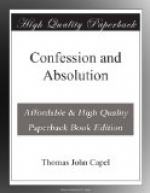Good sense ought to make objectors remember that priests have mothers and sisters and relations whom they love; and priests would be the first to prevent these beloved ones from the demoralizing influences which enemies ignorantly attribute to the confessional.
3. Once more let it be remembered that the Tribunal of Penance is for the accusation and absolution of sin. Name, nor abode, nor fortune, nor domestic concerns, have any place there. The priest is the spiritual physician, and it is the disease which is submitted to him; all else is foreign to his office, nor has he the right to ask of other matters. Nay, more: a sacramental secret surrounds his work; this involves obligations greater than any natural or promised secrecy. Information obtained in Confession the priest can never use, be it in his own interest, or in that of a family, or of the State, or of the Pope, or of the Church. Therefore, to imagine the Tribunal of Penance to be an engine for obtaining and using information in domestic concerns and family secrets, is to be sorely ignorant of the nature of confession and of the obligations of a confessor.
4. Objectors of another kind urge that confession induces persons to sin more readily, or at least it transfers the keeping of conscience to the priest.
Seeing that all which is demanded by Protestants for repentance must be in the mind of the Catholic before he can be absolved, it is clear the objection comes ill from them, and can have no foundation. Of course, for those who believe that Catholics obtain pardon by payment of money, the objection would have weight. But it can hardly be imagined that in the nineteenth century, among an intelligent people like Americans, there are to be found persons who believe that Catholics are so bereft of reason as to imagine that sin can be forgiven by the giving of silver and gold.
Every Catholic knows that to speak falsely in Confession would be to lie to the Holy Ghost, as did Ananias and Saphira; that to confess as Judas did, without sorrow, would not only bring no pardon, but, on the contrary, would add the sin of sacrilege to his soul. The Catholic knows that without a firm efficacious determination of purpose to avoid sin and its occasions, and to satisfy for injuries done, there can be no forgiveness of sin.
Nowhere is the soul of man more prone to self-deception than in the matter of true repentance. Temptation may cease, and with it comes cessation of wrong-doing. This, under self-deception, may be easily construed into conversion. Self-interest and passion may so blind a man that he may imagine himself truly repentant, notwithstanding that he has not pardoned injuries, or reconciled himself to enemies, or restored ill-gotten goods, or retracted calumny, or compensated for wrongs inflicted, or is not disposed to avoid occasions of sin, and the like.
The confessor has to intervene, remind the penitent of these duties, and secure that they shall be done, before he can absolve from sin. Instead of becoming the keeper of the sinner’s conscience, the confessor is but its instructor: duty and responsibility remain in all their extent to the penitent. And the penitent has to test the genuineness of his contrition by unmistakable obligations to be complied with, if forgiveness of sin is to be obtained.




